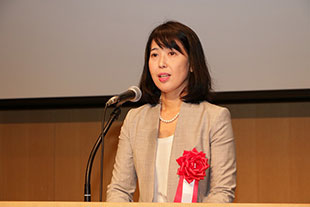 The 17th Asia Pacific Research Prize (Iue Prize) “Commendation” winner: Dr. Miyoko Taniguchi
The 17th Asia Pacific Research Prize (Iue Prize) “Commendation” winner: Dr. Miyoko Taniguchi
Title of Dissertation: “Rethinking ‘Liberal Peacebuilding’ -The Case of Conflict, Violence, and Peace in Mindanao, the Philippines-”

- Dr. Miyoko Taniguchi
-
- Career -
Miyoko Taniguchi specializes in the Peacebuilding, Political Sociology, and Area Studies (Southeast Asia, Philippines, and Mindanao). She is currently a senior advisor on peacebuilding at the Japan International Cooperation Agency. From 2012 to 2014, she was a visiting research associate at the Institute of Philippine Studies, the Ateneo de Manila University, the Philippines. In 2017, she received her Ph.D. (Graduate Program on Human Security) from the Graduate School of Arts and Sciences of the University of Tokyo.
- Summary -
The armed conflict between the state and Muslim insurgents seeking separation from the Philippines, which intensified after the 1970s, has not truly ended, despite the signing of the Comprehensive Peace Agreement in 2014. Furthermore, family feuds among traditional Muslim clans have become common in this region. What is the root cause of such conflict and violence? Are there inherent incentives for the parties? Based on the consciousness of this problem, the objectives of this thesis are to elucidate the structural mechanism of long-lasting conflict and violence and to propose a concept of “peacebuilding” in the context of Mindanao, based on a historical analysis of the governance structures from the pre-Islamized era to the present. In so doing, “Liberal Peacebuilding (LPB),” the theoretical pillar of peace-building activities, will be critically examined, and a new analytical framework and policy implications will be proposed.This thesis was proved through literature and field surveys conducted intermittently from 2006 to 2016. The period covered by the thesis ranges from the pre-Islamized period, through the Sultanate, the U.S. colonial period, to the period following independence from the U.S. In order to elucidate the notions of the state and governance structures in each period, analytical concepts such as “state formation,” “statehood” and “political legitimacy” were used. The first part of the thesis examined cooperative and competitive relations between “state (ruler)” and clan. In the second part, conflict, violence, and peace were reviewed and analyzed through the tripartite relationship of the state, clans, and insurgents. It was revealed that the state strengthened social divisions by triggering violence through resource competition among Muslims by constructing cooperative relationships with some opportunistic insurgents and clans, while conflict and peace talks coexisted between the state and the insurgents. On the other hand, case studies revealed that local leaders built a cooperative relationship with diverse stakeholders, adapted governance norms to the local context, and achieved peace and development.
In conclusion, a new analytical framework is proposed, wherein the structural mechanism that generates conflict, violence, and peace should be examined by a tripartite relationship, cooperative or competitive ones, among state, insurgents, and clans (rather than a binary relationship between state and insurgency). Further, a “peacebuilding” in the context of Mindanao is defined as a process of creating plural public spheres itself through building upon vertical and horizontal ties among tripartite stakeholders, focusing on customary politics and institution.






